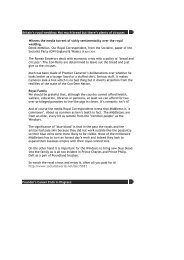New meanings of Panafricanism in the era of globalisation
New meanings of Panafricanism in the era of globalisation
New meanings of Panafricanism in the era of globalisation
Create successful ePaper yourself
Turn your PDF publications into a flip-book with our unique Google optimized e-Paper software.
cont<strong>in</strong>ent, which is be<strong>in</strong>g spearheaded by <strong>the</strong> South Africa-based Eskom Enterprises.<br />
This analysis should also be viewed aga<strong>in</strong>st <strong>the</strong> background <strong>of</strong> <strong>the</strong> fact that <strong>the</strong> very<br />
transition to a lib<strong>era</strong>l democratic polity <strong>in</strong> South Africa was to a large extent <strong>the</strong> result <strong>of</strong><br />
<strong>the</strong> realisation (s<strong>in</strong>ce <strong>the</strong> mid-1970s) by <strong>the</strong> major capitalist <strong>in</strong>terests <strong>in</strong> South Africa that<br />
<strong>the</strong> ideological and <strong>in</strong>stitutional fetters <strong>of</strong> <strong>the</strong> apar<strong>the</strong>id paradigm were prevent<strong>in</strong>g <strong>the</strong><br />
expansion <strong>of</strong> <strong>the</strong>ir pr<strong>of</strong>it-seek<strong>in</strong>g enterprises. He<strong>in</strong> Marais, <strong>in</strong> various contributions (most<br />
recently <strong>in</strong> 2002:95-96) has shown irrefutably – adopt<strong>in</strong>g a k<strong>in</strong>d <strong>of</strong> j’accuse stance – that<br />
<strong>the</strong> marriage between <strong>the</strong> ANC leadership and big bus<strong>in</strong>ess <strong>in</strong> <strong>the</strong> early 1990s at <strong>the</strong> latest<br />
was a delib<strong>era</strong>te match 14 .<br />
The African Renaissance and NEPAD: cont<strong>in</strong>u<strong>in</strong>g <strong>the</strong> great tradition?<br />
There can be no doubt, if one accepts <strong>the</strong> analysis I have <strong>of</strong>fered hi<strong>the</strong>rto, that <strong>the</strong><br />
economic basis for President Mbeki’s attempt to spearhead <strong>the</strong> revival <strong>of</strong> Africa exists <strong>in</strong><br />
South Africa itself. The <strong>in</strong>terests <strong>of</strong> <strong>the</strong> South African state and capital converge and<br />
co<strong>in</strong>cide on this doma<strong>in</strong>.<br />
The old adage, “cometh <strong>the</strong> time, cometh <strong>the</strong> man”, has never been more apt. The<br />
Africanist credentials <strong>of</strong> Nelson Mandela, <strong>the</strong> first president <strong>of</strong> a democratic South<br />
Africa, go back to <strong>the</strong> foundation <strong>of</strong> <strong>the</strong> African National Congress Youth League <strong>in</strong><br />
1944, which, <strong>in</strong> its orig<strong>in</strong>s, was conceived <strong>of</strong> and established as an organisation with a<br />
panafrican mission. Like most <strong>of</strong> <strong>the</strong> leaders <strong>of</strong> <strong>the</strong> ANC before him, President Mbeki,<br />
too, is driven by <strong>the</strong> orig<strong>in</strong>al vision <strong>of</strong> Edmund Blyden, who, like most <strong>of</strong> <strong>the</strong> first<br />
panafricanists was from <strong>the</strong> Caribbean diaspora, and one <strong>of</strong> <strong>the</strong> first black people to<br />
def<strong>in</strong>e <strong>the</strong> mean<strong>in</strong>g <strong>of</strong> <strong>the</strong> panafrican vision. His stress on racial pride and on<br />
acknowledgement <strong>of</strong> <strong>the</strong> humanity <strong>of</strong> people <strong>of</strong> African descent laid <strong>the</strong> foundations <strong>of</strong><br />
<strong>the</strong> subsequent anti-racist ideology which has characterised <strong>the</strong> approach <strong>of</strong> virtually all<br />
14 “The ANC government’s embrace <strong>of</strong> economic orthodoxy was designed precisely to help steer South<br />
African capital out <strong>of</strong> … (<strong>the</strong>) cul-de-sac. Ra<strong>the</strong>r than a grudg<strong>in</strong>g surrender to <strong>the</strong> vagaries <strong>of</strong> <strong>the</strong> ‘real<br />
world’, its economic policies represent a conscious and expectant attempt to rescue – and importantly, help<br />
restructure <strong>the</strong> op<strong>era</strong>t<strong>in</strong>g conditions for – South African capital, and <strong>the</strong>reby hopefully enabl<strong>in</strong>g it to<br />
address some <strong>of</strong> <strong>the</strong> key demands and rights <strong>of</strong> <strong>the</strong> South African majority. (Marais 2002:95) That this is<br />
<strong>in</strong>deed <strong>the</strong> case has recently been confirmed by Terblanche 2002. See especially pp. 96-103<br />
14
















